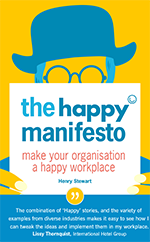Is This a Government Committed to Small Business?
Today David Cameron will claim his government has delivered on supporting small businesses. I’m sorry, Prime Minister, but I don’t see it. Your government’s direct attacks on small business has cost my company in excess of £200,000 a year.
Hi, we are Happy
We are leading a movement to create happy, empowered and productive workplaces.
How can we help you and your people to find joy in at least 80% of your work?

Cameron will apparently claim that he has abolished 800 regulations. I will be interested to hear what they are as, to be honest, I haven’t noticed. Though I have always been part of the majority of small business that does not see red tape as a big issue.
The biggest effect this government has on my company as a small business is in our direct dealings with it. Our experience of the coalition has been entirely negative. Here are two examples
Switching procurement from small to big business
The track record of this government is to buy less from SMEs* and more from large business. Here’s two examples from the training industry:
- For apprenticeships, the government two years ago introduced a minimum contract value of £500,000. Any small company, many of whom had been supplying services direct to government for years, can only now provide apprenticeships through a large provider, normally paying at least 15% of the income to that provider.
- Last year the government decided to outsource all training, on any subject and for every central government department, to one company. Although there was a bid from an SME consortium, the tender was inevitably won by Capita. So instead of hundreds of small businesses delivering training, we have one large provider delivering it all. The previous suppliers face a drastic drop in income and, for some, a threat to their existence. And the feedback I hear is that training takes longer to organise and costs more.
Happy Ltd has been a major provider of training services to government. The Department of Work and Pensions rated us as one of the top two, among their thousands of suppliers, for customer service. But neither value for money nor great service count for anything in this new world. Every government department has been told they must go through Capita.
For the government to structure its contracts so only big firms can win them amounts to an attack on small business.
Make your contracts small business-friendly and see the benefits
Large suppliers are being encouraged, after they win their government contracts, to sub-contract to SMEs. For the small business this is a bit like trying to deliver your normal service while being sat on by an elephant. The flexibility disappears as you work within the procedures of the large company. And the large company makes sure it gets its margin: the SME generally get less income, at the same time as government often ending up paying more.
The problem is that, for all it claims, the government listens to big business. It is big businesses that have a buddy and a hotline to ministers. Small firms are lucky to get any response at all when we try and make contact. (My email to Cameron on minimum contract values got an anodyne response after 9 months.)
Given that it spends its time talking to large corporations, it is not surprising that government ministers believe it is better and more efficient to use large companies. And part of the move to large suppliers comes from the focus on cutting government staff. They estimated it cost £3,000 a year to service each SME providers on the apprenticeship programme. The fact that instead it cost the small provider £40,000 or more to work through a “more efficient” large provider, didn’t matter as it wasn’t a direct cost. (I’d have happily paid the government £3,000 – or more – a year to avoid the cost, bureaucracy and headache of working this way.)
Central planning or market competition: Time to decide
Either you believe market competition provides better value, and set your contracts to maximise it, or you don’t. The government claims to believe this. Or you believe central planning and economies of scale provide better value. That is what the government actually seems to believe, based on what it does.
There are parts of government that understand this. I believe Francis Maude has a group working to make government contracts available to all. I’ve heard of one example, for a software contract, where structuring the contract to allow small firms to compete with the big boys led to a 90% reduction in cost.
Let’s be clear: small firms are not looking for hand outs. We are looking for contracts that are not structured to exclude us. To get the best value, and enable small business, charities and social enterprises to compete, you need contracts that allow it. This government has to decide whether it really believes in small business and market competition or whether it believes – like so many governments before it – that “big is best”.
Keep informed about happy workplaces
Sign up to Henry's monthly Happy Manifesto newsletter, full of tips and inspiration to help you to create a happy, engaged workplace.

Learn the 10 core principles to create a happy and productive workplace in Henry Stewart's book, The Happy Manifesto.
Henry's Most Popular Blogs
- 8 Companies That Celebrate Mistakes
- 9 Benefits of Having Happy Employees
- 321Zero: How I Solved my Email Overload
- 16 Companies That Don't Have Managers
- 5 Big Companies Who Swear by Mindfulness
- 49 Steps to a Happy Workplace
- A Four Day Week? Let's Start With a Four Day August
- Google: Hire Great People and Give Them Lots of Autonomy
- Buurtzorg: No Managers, Just Great Care From a Nurse-Led Service
- 30 Steps to Joy at Work: Get More Done by Being Less Busy

Henry Stewart, Founder and Chief Happiness Officer
Henry is founder and Chief Happiness Officer of Happy Ltd, originally set up as Happy Computers in 1987. Inspired by Ricardo Semler’s book Maverick, he has built a company which has won multiple awards for some of the best customer service in the country and being one of the UK’s best places to work.
Henry was listed in the Guru Radar of the Thinkers 50 list of the most influential management thinkers in the world. "He is one of the thinkers who we believe will shape the future of business," explained list compiler Stuart Crainer.
His first book, Relax, was published in 2009. His second book, the Happy Manifesto, was published in 2013 and was short-listed for Business Book of the Year.
You can find Henry on LinkedIn and follow @happyhenry on Twitter.
Next Conference: Women in Leadership Online Conference
Save the date for our online conference on 12th November 2025, celebrating women in leadership.
You will hear from inspiring female leaders about how they have created happy and empowered workplaces.
There will be interaction, discussion, space for reflection and opportunities to network with other leaders.
Related courses
The Happy Leadership Programme
Brave Leadership: One-Year Leadership Development Programme for Women
Level 7 Senior Leadership Apprenticeship Programme
Not what you need? Take a look at all of our off-the-shelf Leadership and Management programmes.